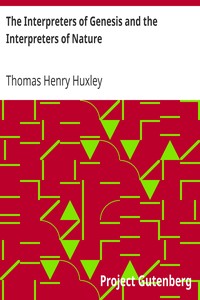The Interpreters of Genesis and the Interpreters of Nature by Thomas Henry Huxley
"The Interpreters of Genesis and the Interpreters of Nature" by Thomas Henry Huxley is a scientific publication written during the late 19th century, specifically in the context of the Victorian era. This essay delves into the relationship between scientific findings and the biblical account of creation in Genesis, exploring themes related to evolution, paleontology, and how these scientific truths align or conflict with religious interpretation. In this essay, Huxley critiques a previous
interpretation of the biblical Genesis, particularly one advanced by the influential British politician William Gladstone. Huxley argues that the scientific evidence regarding the order of the appearance of life—water, land, and air populations—contradicts Gladstone's interpretation derived from Genesis. He presents arguments supported by fossil records and the geological timeline to demonstrate that the sequence suggested by Gladstone does not align with natural sciences' conclusions. Huxley's discourse ultimately reflects on the broader implications of reconciling science with religion, emphasizing that while science might shed light on the complexities of natural history, it does not diminish the moral essence that many derive from religious teachings. (This is an automatically generated summary.)
Read or download for free
| How to read | Url | Size | |||
|---|---|---|---|---|---|
| Read now! | https://www.gutenberg.org/ebooks/2630.html.images | 64 kB | |||
| EPUB3 (E-readers incl. Send-to-Kindle) | https://www.gutenberg.org/ebooks/2630.epub3.images | 109 kB | |||
| EPUB (older E-readers) | https://www.gutenberg.org/ebooks/2630.epub.images | 108 kB | |||
| EPUB (no images, older E-readers) | https://www.gutenberg.org/ebooks/2630.epub.noimages | 75 kB | |||
| Kindle | https://www.gutenberg.org/ebooks/2630.kf8.images | 282 kB | |||
| older Kindles | https://www.gutenberg.org/ebooks/2630.kindle.images | 275 kB | |||
| Plain Text UTF-8 | https://www.gutenberg.org/ebooks/2630.txt.utf-8 | 55 kB | |||
| Download HTML (zip) | https://www.gutenberg.org/cache/epub/2630/pg2630-h.zip | 108 kB | |||
| There may be more files related to this item. | |||||
Similar Books
About this eBook
| Author | Huxley, Thomas Henry, 1825-1895 |
|---|---|
| Title |
The Interpreters of Genesis and the Interpreters of Nature Essay #4 from "Science and Hebrew Tradition" |
| Credits | Produced by D.R. Thompson, and David Widger |
| Reading Level | Reading ease score: 41.4 (College-level). Difficult to read. |
| Language | English |
| LoC Class | Q: Science |
| Subject | Science |
| Subject | Evolution |
| Subject | Bible and science |
| Subject | Paleontology |
| Category | Text |
| EBook-No. | 2630 |
| Release Date | May 1, 2001 |
| Most Recently Updated | Jan 22, 2013 |
| Copyright Status | Public domain in the USA. |
| Downloads | 236 downloads in the last 30 days. |
| Project Gutenberg eBooks are always free! | |

